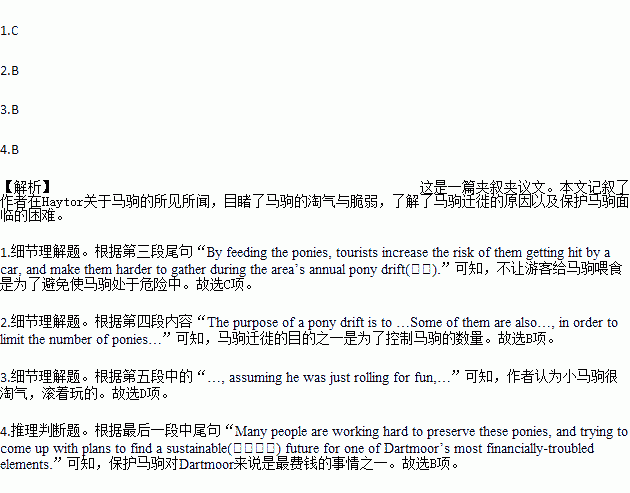题目内容
“I see you’ve got a bit of water on your coat,’’ said the man at the petrol station. ‘‘Is it raining out there?’’ ‘‘No. it’s pretty nice,” I replied, checking my sleeve. “Oh, right. A pony(马驹) bit me earlier.”
As it happened, the bite was virtually painless: more the kind of small bite you might get from a naughty child. The pony responsible was queuing up for some ice cream in the car park near Haytor, and perhaps thought I'd jumped in ahead of him.
The reason why the ponies here are naughty is that Haytor is a tourist—heavy area and tourists are constantly feeding the ponies foods, despite signs asking them not to. By feeding the ponies, tourists increase the risk of them getting hit by a car, and make them harder to gather during the area’s annual pony drift(迁移).
The purpose of a pony drift is to gather them up so their health can be checked, the baby ones can be stopped from feeding on their mothers’ milk, and those who’ve gone beyond their limited area can be returned to their correct area. Some of them are also later sold, in order to limit the number of ponies according to the rules set by Natural England.
Three weeks ago, I witnessed a small near—disaster a few miles west of here. While walking, I noticed a pony roll over on his back. “Hello!” I said to him, assuming he was just rolling for fun, but he was very still and, as I got closer, I saw him kicking his legs in the air and breathing heavily. I began to properly worry about him. Fortunately, I managed to get in touch with a Dartmoor’s Livestock Protection officer and send her a photo. The officer immediately sent a local farmer out to check on the pony. The pony had actually been trapped between two rocks. The farmer freed him, and he began to run happily around again.
Dartmoor has 1,000 or so ponies, who play a critical role in creating the diversity of species in this area. Many people are working hard to preserve these ponies, and trying to come up with plans to find a sustainable(可持续的) future for one of Dartmoor’s most financially—troubled elements.
1.Why are tourists asked not to feed the ponies?
A. To protect the tourists from being bitten.
B. To keep the ponies off the petrol station.
C. To avoid putting the ponies in danger.
D. To prevent the ponies from fighting.
2.One of the purposes of the annual pony drift is _________.
A. to feed baby ponies on milk
B. to control the number of ponies
C. to expand the habitat for ponies
D. to sell the ponies at a good price
3.What was the author’s first reaction when he saw a pony roll on its back?
A. He freed it from the trap.
B. He called a protection officer.
C. He worried about it very much.
D. He thought of it as being naughty.
4.What does the author imply about the preservation of Dartmoor’s ponies?
A. It lacks people’s involvement.
B. It costs a large amount of money.
C. It will affect tourism in Dartmoor.
D. It has caused an imbalance of species.
 天天向上一本好卷系列答案
天天向上一本好卷系列答案 小学生10分钟应用题系列答案
小学生10分钟应用题系列答案
